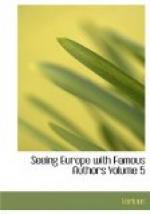Herder was just dead when I arrived at Weimar; but Wieland, Goethe, and Schiller were still there. Their writings are the perfect resemblances of their character and conversation. This very rare concordance is a proof of sincerity; when the first object in writing is to produce an effect upon others, a man never displays himself to them, such as he is in reality; but when he writes to satisfy an internal inspiration which has obtained possession of the soul, he discovers by his works, even without intending it, the very slightest shades of his manner of thinking and acting.
The residence in country towns has always appeared to me very irksome. The understanding of the men is narrowed, the heart of the women frozen there; people live so much in each other’s presence that one is opprest by one’s equals; it is no longer this distant opinion, the reverberation of which animates you from afar like the report of glory; it is a minute inspection of all the actions of your life, an observation of every detail, which prevents the general character from being comprehended; and the more you have of independence and elevation of mind, the less able you are to breathe amidst so many little impediments.
This painful constraint did not exist at Weimar; it was rather a large palace than a little town; a select circle of society, which made its interest consist in the discussion of all the novelties of art and science: women, the amiable scholars of some superior men, were constantly speaking of the new literary works, as of the most important public events. They enjoyed the whole universe by reading and study; they freed themselves by the enlargement of the mind from the restraint of circumstances; they forgot the private anecdotes of each individual, in habitually reflecting together on those great questions which influence the destiny common to all alike. And in this society there were none of those provincial wonders, who so easily mistake contempt for grace, and affectation for elegance.
[Footnote A: From “Germany.”]
ULM[A]
BY THOMAS FROGNALL DIBDIN




